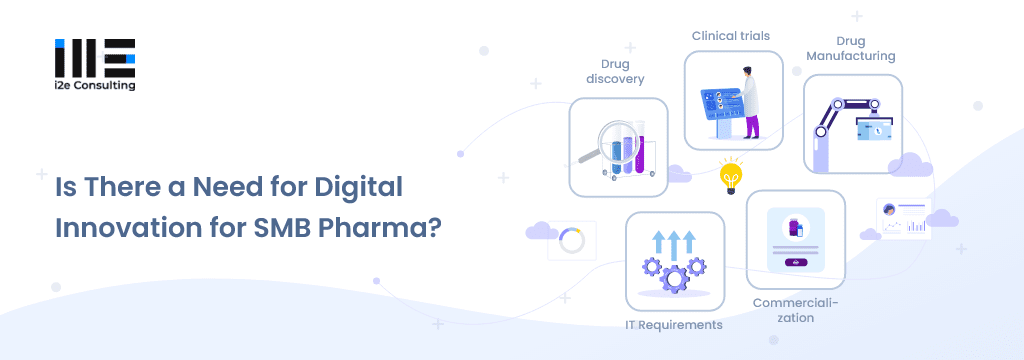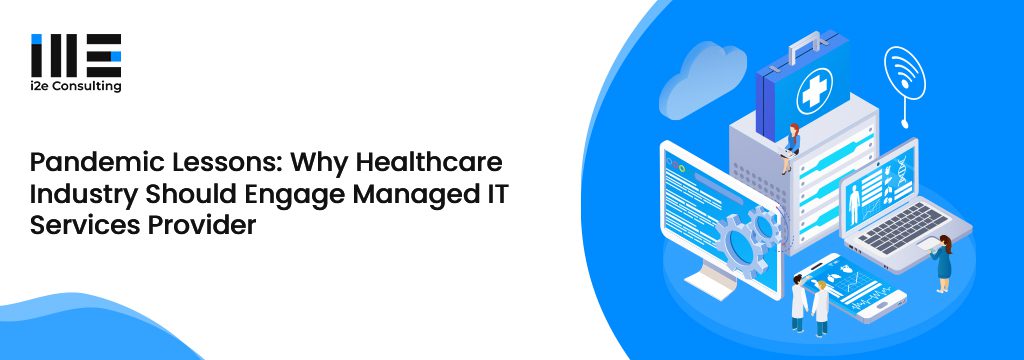
How digitization in SMB pharma can reshape the industry
In recent years, the pharma industry has witnessed a noticeable rise in the number of small and medium-sized pharma companies (SMBs) in drug development. However, many SMBs face operational issues and competitive pressures which are major roadblocks to showcasing their full potential.
Digitalization innovation in SMB pharma could be the answer to some of these issues, as it can help SMBs to achieve not only operational efficiencies but also assist in making informed decisions, better data management, and cost-cutting.
In this blog, we will tell you about the various areas where digital innovation in SMB pharma can happen.
- Drug discovery
Drug discovery is a complex process that involves numerous time-consuming steps. It is also one of the major undertakings for pharmaceutical companies which has a low success rate. Technology can help companies to accelerate certain mundane tasks in the drug discovery process, thus helping them to focus on other core activities.
So, what are the possibilities for digitalization in the drug discovery process?
- Deep learning algorithms to predict the molecular properties of chemical compounds. Machine learning helps in decreasing drug failure rates during clinical developmental stages.
- Neural networks can automate challenging tasks like distinguishing diseased cells from healthy ones.
- Neural networks are also helpful in predicting the absorption, distribution, metabolism, and excretion (ADME) of molecular compounds.
- Algorithms can also predict new ideas for molecules that can be useful to treat new diseases. This helps the drugs to reach clinical trials much quicker.
- Clinical trials
The clinical trials process is crucial for a drug to reach the consumer, however, the average dropout rate of a drug from a clinical trial is almost 30%. SMBs can minimize this dropout rate by including technology in the various aspects of clinical trials.
- Data science and natural language processing can be used to scan huge medical databases and extract useful information to optimize the clinical trial process.
- Electronic health records (EHRs) have become the new standard that can reduce errors, enhance workflow efficiency, and refine healthcare coordination.
- Digitalization of the patient’s health records made it easy to screen and select accurate patients for the clinical trials.
- A combination of cloud software and wearable devices helped monitor patient vitals and alert the medical professionals about any anomalies.
- Specialized applications can decentralize the clinical trial process, which may help in improving patient satisfaction and engagement.
- Drug Manufacturing
Small and medium-sized pharma companies often battle with operational issues such as lower capacity utilization, quality control, and breakdown issues in the plant. Technology can help organizations bridge the gaps and achieve operational excellence in drug manufacturing.
Here is how you can do it
- Internet of Things (IoT) helps in connecting all the stake holders in real-time. This will help SMBs to make sure the high demanded drugs are manufactured at the right time.
- IoT sensors embedded in the manufacturing units can pave way for predictive analytics.
- Data analytical tools enable real-time monitoring of critical variables of the production line.
- Getting real-time data from all the manufacturing equipments provide valuable data for making data-driven decisions to achieve superior quality control.
- Commercialization
Effective commercialization process ensures the drug reaches the right consumers at the right time. The traditional drug marketing process is time taking and is not based on real-time information. Multi-channel marketing automation can provide many consumer touchpoints and deliver personalized marketing messages.
You can market your drugs better using technology as below.
- AI-powered analytical solutions can predict consumer behaviours, this might help the customer representatives to schedule the meeting with the right doctor at the right time and place.
- Digitalization helps to consolidate all the pharma marketing workflows into one system, which allows anyone in the sales channel to get the full picture.
- Using analytics, sales representatives can segment doctors and send customized marketing messages.
- Digital solutions can also help sort, clean, and tabulate the huge marketing data making it easy to get actionable insights.
- IT Requirements
One of the major hindrances for pharma SMBs to adopt digitalization is the lack of IT skills and knowledge. Pharma companies need not spend time and effort learning IT skills, they can partner with IT consulting companies to do the work for them. This way the SMBs can focus more on their core business activities.
Here are some IT services that can help.
- IT service partners can help set up the cloud infrastructure and integrate your legacy systems into it.
- They would implement some of the best practices of IT when it comes to data management and security.
- From employee onboarding to exit, the IT services partner can handle all the requirements related to technology.
- They would also provide support, maintenance, and would also guide you through all your IT requirements.
Going forward digital transformation in the pharma industry is going to be the norm. The companies that can adapt to these changing circumstances will have an edge over others on the market. With new diseases coming up, the pharma industry is under a lot of pressure to create affordable drugs with a quick turnaround time.
However, the pharma industry is also one of the few industries that is governed by stringent rules and regulations. Digitalization can also help SMBs to stay compliant with the regulations while achieving operational excellence and a good turnover rate.
Need for information on SMB pharma digitalization? Then fill in your details in the form below and we will contact you.










